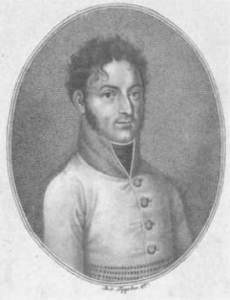First love
(Poet's title: Die erste Liebe)
Set by Schubert:
D 182
[April 12, 1815]
Die erste Liebe füllt das Herz mit Sehnen
Nach einem unbekannten Geisterlande,
Die Seele gaukelt an dem Lebensrande,
Und süße Wehmut letzet sich in Tränen.
Da wacht es auf, das Vorgefühl des Schönen,
Du schaust die Göttin in dem Lichtgewande,
Geschlungen sind des Glaubens leise Bande,
Und Tage rieseln hin auf Liebestönen,
Du siehst nur sie allein im Wiederscheine,
Die Holde, der du ganz dich hingegeben,
Nur Sie durchwebt deines Daseins Räume!
Sie lächelt dir herab vom Goldgesäume,
Wenn stille Lichter an den Himmel schweben,
Der Erde jubelst du: Sie ist die Meine!
First love fills the heart with longing
For an unknown land of spirits,
The soul hovers on the rim of life
And sweet melancholy expresses itself in tears.
Then it awakes, the presentiment of beauty,
You behold the goddess robed in light,
The loose ties of faith are fastened,
And days peel off on the notes of love.
She is the only person you see in reflections,
The fair one, to whom you have given yourself completely,
Only she pervades the space of your being.
She smiles down on you from golden extremities,
When quiet lights float in the sky
You call out to the Earth in celebration: ‘She is mine!’
All translations into English that appear on this website, unless otherwise stated, are by Malcolm Wren. You are free to use them on condition that you acknowledge Malcolm Wren as the translator and schubertsong.uk as the source. Unless otherwise stated, the comments and essays that appear after the texts and translations are by Malcolm Wren and are © Copyright.
☙
Themes and images in this text:
Clothes The earth Emptiness and fullness Flying, soaring and gliding Ghosts and spirits Gold Hearts Heaven, the sky Light Longing and yearning Melancholy Mirrors and reflections Rims and edges Sleep Songs (general) Soul Space Tears and crying
This poem takes a strangely detached and analytical approach to the experience of first love. It is not clear whether the poet is attempting to understand what has happened by means of detachment and distance or whether he wants to persuade the reader (but himself mainly) that the experience is something that should be accepted and embraced.
This tension is first expressed in stanza 1 with two metaphors based on vessels. The heart is a vessel that is ‘filled’ with longing for an unknown land of spirits. Yet the soul is itself hovering outside another vessel, hesitant to dive into life itself. The experience of first love takes us ‘to the rim of life’ (looking from the outside) or ‘to the brink’ (looking at the vessel from the inside). We are at the same time filled to the brim (to overflowing, so much so that tears spill out) and standing on the edge, about to take the plunge.
Stanza 2 explores the experience of deepening conviction. We move from a ‘presentiment’ of beauty to direct perception of beauty itself as the beloved object is now accepted as a ‘goddess’. The loose ties of faith are fastened up so that belief becomes certainty through a process of enlightenment (symbolised by the beloved being dressed in ‘clothes of light’).
We should probably read this 14 line, 3 stanza poem as a sonnet, in which case the end of line 8 will have brought us to the volta. The emotional turning point has arrived since the duality has been resolved by this new certainty; I am no longer torn between being ‘outside’ and ‘inside’ the experience, between observing and venerating the beloved from afar and being obsessed with her from within. We now have the language of totality: ‘nur sie alleine’ (only she, she alone), ‘ganz . . . hingegeben’ (totally submitted), ‘nur sie’ (only she), ‘deines Daseins Räume’ (the space of your being). Thus she pervades (‘durchschwebt’) me. There is nowhere where she is not, which is why every reflection I see is an image of her as well as (instead of?) me. This is what allows me to claim that ‘she’ is ‘mine’: the two are now one. The golden extremities or fringes which she illuminates (an image based on the horizon at sunset) no longer point to a world beyond or outside my experience; their function is to enclose me in a unified totality. The lights in the sky (the stars) that are hovering or floating (schweben) are part of the goddess who now infuses (durchschwebet) me and pervades my universe.
☙
Original spelling and note on the text Die erste Liebe Die erste Liebe füllt das Herz mit Sehnen Nach einem unbekannten Geisterlande, Die Seele gaukelt an dem Lebensrande, Und süße Wehmuth letzet sich in Thränen. Da wacht es auf, das Vorgefühl des Schönen, Du schaust die Göttin1 in dem Lichtgewande, Geschlungen sind des Glaubens leise Bande, Und Tage rieseln hin auf Liebestönen; Du siehst nur sie allein im Wiederscheine, Die Holde, der du ganz dich hingegeben, Nur sie durchwebet deines Daseyns Räume! Sie lächelt dir herab vom Goldgesäume, Wenn stille Lichter an den Himmel schweben, Der Erde jubelst du: "Sie ist die Meine!" 1 This word was misprinted as 'Gattin' (wife) in the source that Schubert used
Confirmed by Peter Rastl with Schubert’s source, Selam. Ein Almanach für Freunde des Mannigfaltigen. Herausgegeben von I.F.Castelli. Dritter Jahrgang 1814. Wien, gedruckt und im Verlage bey Anton Strauß, page 40; with Selam. Ein Almanach für Freunde des Mannigfaltigen. Herausgegeben von I.F.Castelli, Vierter Jahrgang 1815, Wien, gedruckt und im Verlage bey Anton Strauß, page 59; with Johann Georg Fellinger’s poetische Schriften. Herausgegeben von Johann Gottfried Kumpf, M.D. Erster Band. Gedichte. Erster Theil. Klagenfurt, 1819. Gedruckt bey A.Gelb, mit v.Kleinmayr’schen Schriften, page 63; and with Carinthia. Ein Wochenblatt zum Nutzen und Vergnügen. No. 37. Klagenfurt, [September] 1812.
To see an early edition of the text, go to page 40 [84 von 384] here: http://digital.onb.ac.at/OnbViewer/viewer.faces?doc=ABO_%2BZ255496805


